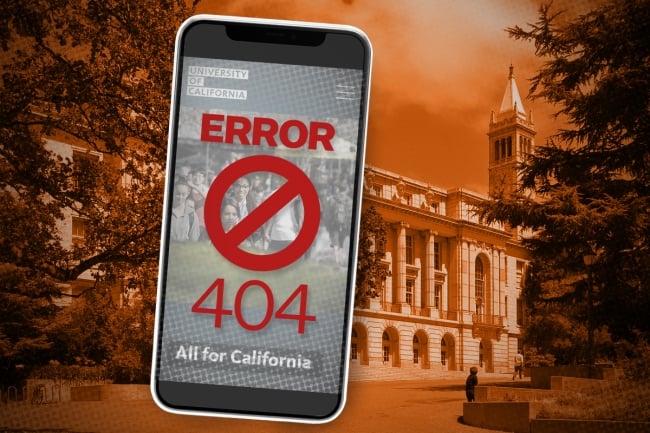You have /5 articles left.
Sign up for a free account or log in.

The University of California system Board of Regents reversed a ban against students receiving degrees for classes taken exclusively online after its Academic Senate first added an “experience requirement” for students in 2023.
The University of California is ending a ban on allowing students to study for their degrees entirely through online courses.
The UC Board of Regents voted 10 to 1 on Feb. 14 to repeal a year-old decision by the Academic Senate. That 2023 decision essentially banned online degrees from the university system, requiring anyone seeking an online degree to get an exception to that “campus experience” requirement.
The vote has raised issues about the balance of power between the regents and the Academic Senate.
“It’s within the board’s authority to make a decision in the area of degree requirements, but the way it was carried out was damaging to shared governance,” said James Steintrager, chair of the Academic Senate.
Steintrager said there are no immediate plans to respond to the regents’ reversal, adding that the Senate does not have the power to override the decision. But, he said, there will be a response about the regents’ decision-making process.
“I was taken aback in the way they did it, because they listened to the argument but had no meaningful Q&A,” he said, referring to the lack of questioning during his presentation at the meeting. “They seemed to have a willingness to act without being informed.”
Rich Loeb, chair of UC’s Board of Regents, acknowledged during the Feb. 14 meeting the precarious governance balance.
“We’ve been trying to find the best way forward to uphold the rights and responsibilities of the board while maintaining the respect and boundaries of shared governance,” Loeb said. “Ultimately, we decided to follow bylaws and take the matter as a recommendation from the [Academic] Senate.”
The latest move is not the end of the debate. Late in 2023, faculty leaders and administrators at the university formed a 20-member presidential task force to look into the efficacy of online degree programs and evaluate instructional approaches. University leaders characterized the committee as a way to “provide for high-quality in-person, hybrid and online offerings for students, including innovations that promote engagement and learning no matter where students are located.”
The task force review is needed because much of the research on online course efficacy is done in for-profit institutions, UC provost Katherine Newman said.
“Those institutions don’t resemble the University of California,” she said during the regents’ meeting this month. “The data that comes out isn’t particularly comparable, and it’s why it’s so important to have a task force to look at it.”
The task force is expected to bring its own recommendations to the Academic Senate by the end of the summer.
“We have experts that have been working on this issue of what constitutes UC quality, and that will be very much front and center of our discussions,” Steven Cheung, the task force’s co-chair, said in a previous interview with Inside Higher Ed. “I think I can speak for the faculty and administration when I say we are not interested in a second-rate program; it has to meet University of California system quality.”
Steintrager said the Academic Senate’s initial “campus experience” requirement was mainly to ensure no undergraduate students built degrees out of courses fully offered online. “It was closing a loophole for unintended fully online degree programs. This wasn’t recognized by the board,” he said.
On the regents’ undoing the ban, Steintrager said he had less of a problem with the reversal and more of an issue with the way the regents made the decision.
He said the presentation seemed to be a formality “at best.”
“Which is not, in my view, the way a university of the caliber of the University of California should conduct its business,” he said.





